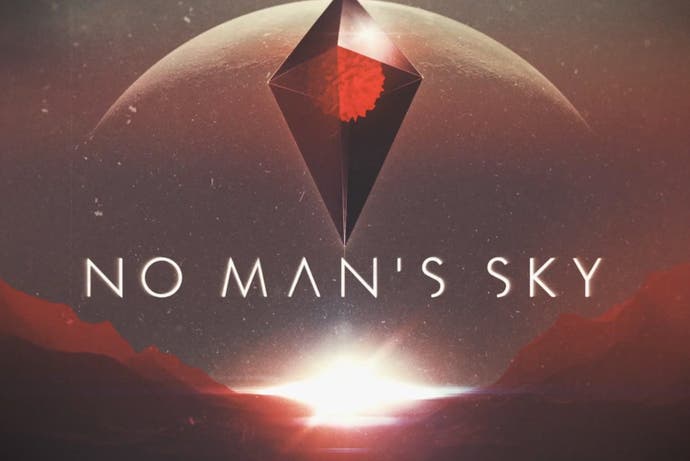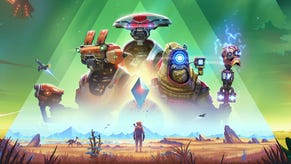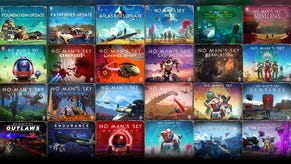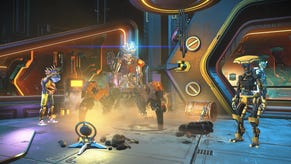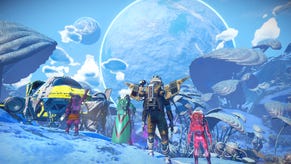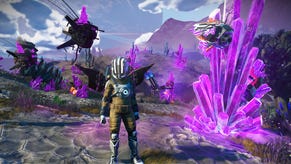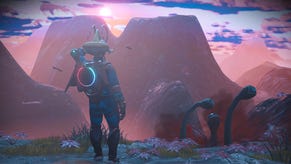So, what do you actually do in No Man's Sky?
Sean Murray explains what to expect on your way to the centre of the universe.
"Space is big", wrote Douglas Adams in The Hitchhikers Guide to the Galaxy. "You just won't believe how vastly, hugely, mind-bogglingly big it is. I mean, you may think it's a long way down to the chemist's, but that's just peanuts to space..."
It's a description that could not only apply to No Man's Sky, the enormous PlayStation 4 game being developed by the tiny Hello Games studio in Guildford, but also one that you sense would bring a smile to the lips of its likeable and loquacious lead, Sean Murray.
The Irishman introduced his game onstage at the last December's PlayStation Experience in Las Vegas by claiming if one of its procedurally generated planets was discovered every second, it would take around 584 billion years to log them all.
"A really hard Platinum Trophy to get," he quipped. "Not only will you all be dead, but so will the earth and the sun..."
Murray then showed a video clip of No Man's Sky in action that was much like all of the other video clips of No Man's Sky in action that we've seen before in that it was both breathtakingly beautiful and impossibly exciting, and yet somehow still failed to convey anything tangible about the larger game or your role in it.
So when, the following day, I'm granted a private audience with both the game and its creator in his endearingly cluttered suite at the Venetian Hotel, I can't resist starting by asking him: what do you actually do in No Man's Sky?
"There's the answer I want to give, and then there's the one I can't really say," Sean replies with an impish smile before, tellingly, embarking on a meandering answer that lasts the best part of five minutes.
"So, the one I want to give is to say it's open ended, and players should be able to play a game lots of different ways. I have begun to find games quite predictable. Especially when I look at the stuff at E3, or something like that. I will be sort of... maybe not excited, but I know I will play those games and I will enjoy them.
"And this makes me sound very jaded but I'm not. I do absolutely love games. But... it's very predictable. I know when I see a screenshot exactly what the game is going to play like, probably how long it's going to be, and how it's going to finish.
"So, we wanted to be a bit more open ended than that. And that isn't a new thing. If you look at PC and a lot of the games that are on Early Access right now, they are more and more that type of open ended thing. And it's not niche; it's like Minecraft and DayZ and Rust. And none of them really work - or sound like they work - on paper. They don't have a classic motivation, or whatever. And I like that. I want to avoid having the game say, 'One of three space stations destroyed!', or having a trophy pop up [when you destroy all three].
"That's the answer that I want to give... But then there's the answer I have to give, just because you have to talk about the game and write about it and convey it. So there is a core game mode there. There's the player's journey which, if they play it linearly and go from the outer edge of the galaxy to the centre of the galaxy, that's their start and end of the game kind of thing.
"And as they go, they're upgrading their ship, they're upgrading their weapons, they're upgrading their suit. And they need to do that because they're very vulnerable, they will be attacked by AI, potentially - very rarely - other players, things like that, if they cross paths with them. There's space combat, there's combat on the ground, there's trading if you want to do that, mining resources and stuff, there's exploring if you want to do that.
"There's all those things in a core loop. Most of them give you money - which we call Units - and you can use that money to upgrade your ship. And you need to do that to be able to travel further. As you get closer to the centre of the galaxy you will find it is more dangerous - just like in any game - and you will find that the best ships are only available towards the centre of the galaxy. Or are much more common at least. And the best weapons, best suit upgrades, and resources that are worth far more. And freighters that you can attack are worth far more closer to the centre because they're trading those resources.
"That's the answer that you need to put [No Man's Sky] in a box. And the next thing will be, 'and it's a first person survival action game' or something like that. And then we can all go home. That's the thing that I know you need to be able to convey to somebody, that there are classic game loop elements. And genuinely we're trying to convey that with everything we've released so far.
"We were trying to show trading [during the onstage demo], and we've tried to show space combat before - and there are games that are only space combat, so it's not like there's a lack of things to do in No Man's Sky.
"When people say, 'What do you do? What's it all about?', it's because, I think, they want to know where the limits are. They're like, 'Okay, you do that... but what else do you do?' is how I take it. And I think people are interested because it's a little bit different, and they don't want us just to have 'Three of six headshots achieved!'. That's not really why people play games anyway when it comes down to it.
"That's the longer, slightly more boring answer."
So there's nothing to stop you just pootling around on the outer edges of the galaxy for hours on end?
"That's the truth of it. And I think that's what's interesting in games at the moment. There's nothing to stop you. Everyone starts on a different planet on the outer edge of the galaxy and there's nothing to stop you never getting in your ship. Just walking around a planet, if that's what you want to do... It's not what I want to do, but some people may want to - and they'll have a Twitch channel, and they'll have people watching them, probably.
"And when I was saying games are predictable, that's the part [of non-linear games] that's not predictable. 90 per cent of their content is just people - I'm going to say expressing themselves in their games, but it's actually people dicking about in a game. But that's what people are interested in, and that's how people play games, I think. When GTA 5 came out, that's what everyone was doing - playing it in loads of different ways. And that's what I think is interesting."
By this point Sean has booted up the debug PS4 attached to the TV taking up half the wall in his suite's living area and launched the latest build of the game. His attention flips to the familiar scene on screen: the interior of the space station at the start of the previous day's demo, only this time the game is running in real-time and being controlled by a DualShock 4.
"So, this is what we showed at PlayStation Experience. I didn't show it live but I'll do it now. I probably should have done," explains Sean as he eases his ship out of the trading facility and into the distinctive mustard-yellow expanse of space beyond. Almost immediately other craft swarm around our own.
"So these are other ships that are on a trade route, heading down to this trading post."
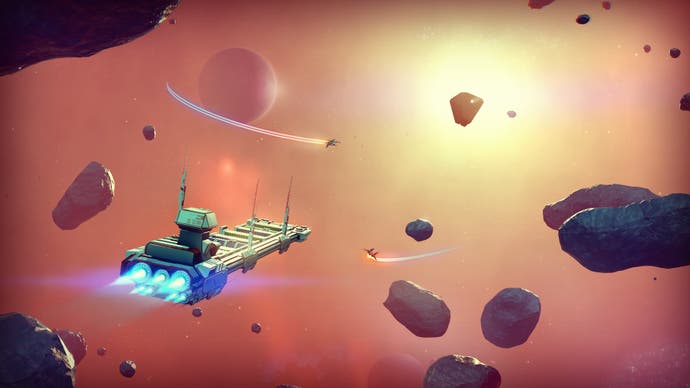
So they'll likely be AI controlled?
"These guys are AI, yeah. And, actually you won't know if they're AI or real players in the final game. It's not a thing we're going to mark, I think."
So how will you know if a ship is controlled by a real player?
"You won't. But they might get out of the ship and start moving around [on the surface of a planet], so then you would."
Sean steers his ship towards the nearest planet and the game engine transitions seamlessly from ethereal space to tangible surface, geographical features forming into view before our eventual touch down on a trading post's landing pad.
"For some people this might be a thing they're doing all the time, it might be something they're doing occasionally, or it might be the whole game mode for them," explains Sean. "Going between different space stations, gathering different kinds of resources - you can combine resources and they become more valuable - and just basically being a trader. You would be attacked quite often as a trader because when your ship is destroyed, you will drop the cargo that you have, and whoever attacked you can get it.
While talking, Sean has jumped to a random planet and started diving down to it's surface.
"I was going to do this live, and I think it would have gone down well, but I bottled it in the end," he says sheepishly, explaining that he was worried that the build might have crashed. "Or we might just get a really ugly planet, which is the most likely thing that will happen. And I apologise in advance..."
The planet that unfolds before us is both utterly boring and uniquely beguiling all at once, its procedurally generated geography possessing none of the sculpted grace of other games and yet looking all the more lifelike for it. As we skim over previously unexplored land masses and alien-looking liquid expanses, it's easy to imagine landing, setting up a basecamp and, yes, never returning to your ship again.
"And this looks like a particularly boring and ugly planet," says Sean, almost breaking the spell with his air of a man who has seen it all before, even though he couldn't possibly have seen this before. "Hmmm... It's got some creatures... That would be an alright screenshot.."
Eventually he lands in what looks like a crystalline tundra, steps out of the cockpit and takes out a scientific instrument of some description.
"So, a thing that we haven't really shown off yet is resources. We're not generally showing this - and it will look better in the finished game - but you can scan by pressing [the square button], and you can 'see' certain resources... You can look around..."
As Sean scans the environment, cubes of collectible materials are outlined against the terrain. He then fires projectiles towards them, destroying great chunks of the scenery with a shimmery sci-fi sound effect.
"You can see the terrain is destructible, which is something we haven't shown people before..."
So you can terraform?
"We're not sure how much we want to say because I don't want it to become the thing. Even showing this I'm nervous, because people will think, 'Oh, right - it's like Minecraft', and then it becomes that. 'It's the Minecraft in space game!'
"Resource gathering in every game is normally super boring, and people purposely make it like a chore. And we want it to be fun. It's something we're still playing about with. It's quite fun to be able to do it from a distance, and we also have this grenade thing. Now this isn't how it will look - it will be like plasma ball - you'll just have to trust me. And that blows holes in the terrain. And if you're really good... [Sean expertly levels the surrounding scenery]
"I find myself just doing this, being on a mountain and scanning and then just destroying everything around me. Doing the usual stupid things of drilling a hole and having an animal fall into it. Stuff like that keeps me amused. And when people are like, 'What do you do [in No Man's Sky]?', the reality is, for some people just that, and that's fine.
And then, just as our time together is coming to an end, my head explodes. With a flourish, Sean brings up the game's Galactic Map and starts zooming out of it - slowly at first, and then picking up speed, past planets and stars and solar systems and galaxies. I'm thankful for my voice recorder because although he's explaining the thinking behind it, all I can focus on is just how vastly, hugely, mind-bogglingly big it is.
"I really like this because it's that moment games often try to do, or promise, but it's often just a 2D map. It's fake. But we wanted something that felt real. So... these are the other solar systems that you can go to, that you can jump to. For the sake of this demo I can just go to anywhere but as a player this would be how far your hyperdrive can carry you. The thing we're trying to get across I guess is how big things are.
"That's the centre of the galaxy we're looking at, and it's quite a way's away," he continues, as dots of light dance and twirl like individual flakes inside a snow globe. "Every one of those [dots] is a star, and every one of those will have it's own solar system. So when you were talking about the possibility of meeting other people..."
I tell Sean it must be akin to the experience Douglas Adams (him again) had in mind when inventing the Total Perspective Vortex machine from The Restaurant at the End of the Universe, a torture device intended to destroy its victim's mind by showing them a scale model of the universe along with a microscopic dot bearing the legend, 'YOU ARE HERE'.
"It's funny, actually," he laughs, "we haven't shown this to many people, but I've had some weird questions, like 'How big is our universe?', and 'What's the point of it all?'
Indeed. Whether No Man's Sky will solve the meaning of life is debatable, but it could well end up taking yours over when it finally touches down later this year.
